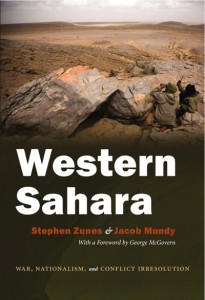Author Archive: Stephen Zunes
STEPHEN ZUNES is Professor of Politics and International Studies at the University of San Francisco, and chair of the university’s Middle Eastern Studies Program. He serves as senior policy analyst for the Foreign Policy in Focus project of the Institute for Policy Studies, is an associate editor of
Peace Review, a contributing editor of
Tikkun, and chair of the academic advisory committee for the International Center on Nonviolent Conflict.
Visit Stephen Zunes’s website for a list of his publications and further biographical information.
by Stephen Zunes and Noor Al-Haidary

Yemeni protesters wear pink as symbol of nonviolence; courtesy went2thebridge.blogspot.nl
As with the 2011 uprising against the Saleh regime in Yemen four years ago, an unarmed civil society movement is now (April 2015) rising up to challenge the Huthi militia. While media coverage of the tragic situation unfolding in Yemen in recent months has focused on armed clashes and other violence, there has also been widespread and ongoing nonviolent civil resistance employed by a number of different actors. In fact, the most significant setbacks to the Huthi militia in their march southward across the country in recent months have come not from the remnants of the Yemeni army or Saudi air strikes, but from massive resistance by unarmed civilians which has thus far prevented their capture of Taiz, the country’s third largest city, and other urban areas. The resistance efforts have also pressed the Huthi to withdraw their forces from a number of previously held areas, including universities, residential neighborhoods, and even military bases. This kind of nonviolent resistance by ordinary people is remarkable, but it is not new in Yemen.
Read the rest of this article »
by Stephen Zunes
Nonviolent action campaigns have been a part of political life for millennia. History records many instances of groups rising to challenge abuses by authorities, demand social reforms, and protest militarism and discrimination. In recent years, however, the number of such movements has increased, as has their success in advancing the cause of human rights and toppling or dramatically reforming repressive regimes. In the twentieth century, nonviolence became more of a deliberate tool for social change, moving from being largely an ad hoc strategy growing naturally out of religious or ethical principles to a reflective and, in many ways, institutionalized method of struggle.
Campaigns to reform discriminatory laws through nonviolent action—such as the civil rights movements in the United States—are one example of how human rights have been advanced through the use of nonviolent action. More significant, however, has been the remarkable upsurge in nonviolent insurrections against authoritarian regimes. Many of the individual revolts have received major media attention—such as those in China, the Philippines and Eastern Europe—and certain political consequences of these largely pro-democracy movements have been analyzed. However, there has been little recognition of the significance of the increasing utilization of nonviolent methods to affect change in nations where guerrilla warfare from below or gradualist reform from above were once seen as the only alternatives. Despite the diffusion of nonviolence as a conscious strategy through movements around the world in recent decades, little is understood about how or why nonviolence works as a technique for securing social change. “Nonviolence” is not even a category in the mainstream academic lexicon.
Read the rest of this article »
by Stephen Zunes

Cover courtesy of University of Syracuse Press.
On the outskirts of a desert town in the Moroccan-occupied territory of Western Sahara, about a dozen young activists are gathered. They are involved in their country’s long struggle for freedom. A group of foreigners—veterans of protracted resistance movements—is conducting a training session in the optimal use of a “weapons system” that is increasingly deployed in struggles for freedom around the world. The workshop leaders pass out Arabic translations of writings on the theory and dynamics of revolutionary struggle and lead the participants in a series of exercises designed to enhance their strategic and tactical thinking. These trainers are not veterans of guerrilla warfare, however, but of unarmed insurrections against repressive regimes. The materials they hand out are not the words of Che Guevara, but of Gene Sharp, the former Harvard scholar who has pioneered the study of strategic nonviolent action. And the weapons they advocate employing are not guns and bombs, but strikes, boycotts, mass demonstrations, tax refusal, alternative media, and refusal to obey official orders.
Serbs, South Africans, Filipinos, Georgians, and other veterans of successful nonviolent struggles are sharing their knowledge and experience with those still fighting dictators and occupation armies.
The young Western Saharans know how an armed struggle by an older generation of their countrymen failed to dislodge the Moroccans, who first invaded their country back in 1975. They have seen how Morocco’s allies on the U.N. Security Council—led by France and the United States—blocked enforcement of U.N. resolutions supporting their right to self-determination. With the failure of both armed struggle and diplomacy to bring them freedom, they have decided instead to employ a force more powerful.
Read the rest of this article »






